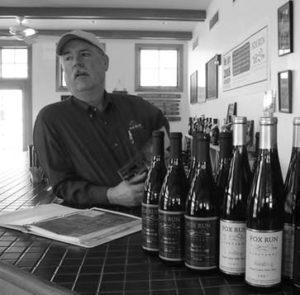Workbook Guides Grape Growers Toward Sustainability
Grape growers are using a new action-planning tool – the New York Guide to Sustainable Viticulture Practices Grower Self-Assessment Workbook – to enhance economically-sound production with minimal environmental impacts.
The eight-section, 134-question workbook facilitates evaluation of soil and nutrient management; weed, disease, and insect control; and the vineyard business’s economic needs. Getting the workbook into producers’ hands is part of the Cornell University Sustainable Viticulture Extension outreach project, underwritten by funding from the New York Farm Viability Institute. Nearly 100 growers have participated in the project to date.

Scott Osborne reviews his New York Guide to Sustainable Viticulture Practices Grower Self-Assessment Workbook in the tasting room at Fox Run Vineyards. Photo by Fox Run Vineyards
“The goal is to promote the adoption of the best management practices to increase the sustainability of grape production throughout New York State,” says project leader and Cornell Viticulture Extension Specialist Timothy E. Martinson.
By late 2008, Fox Run Vineyards owner Scott Osborn had completed the workbook and an action plan with a year’s worth of objectives for 2009 for his 50-acre vineyard on NY’s Finger Lakes’ Seneca Lake Wine Trail in Penn Yan.
Osborn’s business includes a vineyard of 14 varieties of grapes, a winery, café, wine club, year-round events calendar and a product line of Chardonnays, Cabernets, Rieslings, Pinot Noirs, etc., garlic grapeseed oil, and gift baskets sold direct and online to consumers and to retailers and restaurants.
“Using the workbook will be an ongoing process that takes us through the seasons and keeps us on track with the goals we have set to be sustainable,” Osborn says.
He defines sustainability as “a business that is profitable and can sustain itself into the next growing season while treating the land respectfully to maintain it well year after year.
“I am always trying to make my business better, and as a steward of the land, I also want to leave it better than when I started. We try to grow ‘organically’ as much as possible. For times when a pest or disease infestation requires a stronger approach, we have planned for mechanical weed removal and to use sprays as minimally as possible.”
Osborn says so many details make it challenging for vineyard managers, as small business owners, to focus on everything.
“The workbook provided an objective starting point on paper to evaluate what I need to do all year-long. It treats the vineyard as a whole package while categorizing different production aspects for specific attention. I can refer to the workbook to focus on needs I may forget and it helps me see where I am doing things just right,” Osborn says.
Osborn expects to see the results of his vineyard modifications as production steadily improves and stabilizes with consistent yields and high quality in spite of year-to-year climate variability.
“Using the workbook will help me track the impact of vineyard practices, soil enhancements, mulching and weather,” Osborn says.
Sustainable Viticulture Extension Educator Jamie Hawk says minimizing soil erosion, adding organic matter, disease scouting, and improving agrichemical storage and mixing facilities are among changes producers are making.
Martinson adds, “The use of cover crops, mulching, diversion ditches and grassed filter strips are other actions growers are taking to prevent erosion and runoff to protect water quality.”
“The growers’ action plans serve as sustainable roadmaps for decision-making on every aspect of vineyard management to reduce costs, gain efficiencies and respond to marketplace interest in sustainably-produced products,” Hawk says.
Osborn says his task list includes adding notice of his sustainability practices to his wine labels, “particularly for consumers who read labels looking for sustainably-produced products, and to educate buyers who do not yet know the value of Fox Run’s philosophy and production practices.”
Copies of the Sustainable Viticulture Workbook are available online for $30.
This article first appeared in American Agriculturalist and is reprinted with permiss

